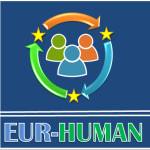EUropean Refugees-HUman Movement and Advisory Network
Acronym: EUR-HUMAN
Third Programme for the Union’s action in the field of health (2014-2020)
Specific Call HP-HA-2015
Duration: 12 months
Grant Amount: 1,320,113 Euros
Co-ordination by the University of Crete (UoC)
Participating countries:
Austria, Croatia, Greece, Italy, Hungary, the Netherlands, Slovenia, UK
The international refugee crisis has reached a critical point and many European countries are developing policy and plan to better define their role in supporting refugees entering Europe. The aim of this proposal is to enhance the capacity of European member states who accept migrants and refugees in addressing their health needs, safeguard them from risks, and minimize cross-border health risks. This initiative will focus on addressing both the early arrival period and longer-term settlement of refugees in European host countries. The existing European and international experience will be systematically reviewed to identify effective interventions to vulnerable groups and tools for the initial health care needs assessment of the arriving refugees including mental, psychosocial and physical health. Established approaches including Participatory and Learning Action and Normalization Process Theory will be used to gain new understanding regarding the needs and opinions of both refugees and stakeholders in regards to the measures needed for health care assessment, and preventive activities including vaccinations, general health hygiene measures, chronic disease management, and psychosocial support. The content of the services that an early or late hosting multi-disciplinary center could offer in the countries that they will accept refugees will be discussed and defined by an international expert panel. Clinical protocols, guidelines together with health education and promotion material and as well as a training programme will be developed for staff serving the refugees and migrants health care centre and tailored protocols and pilot testing in six implementation settings in Greece, Italy, Croatia, Hungary, Austria and Slovenia with contribution from experts and stakeholders from Turkey, Cyprus, Ireland and Belgium. Finally, all these efforts will be evaluated and a final report for implementation in European settings will be produced to guide best practice in this important humanitarian effort.
Graphical presentation of the Work Packages of the EUR-HUMAN project


